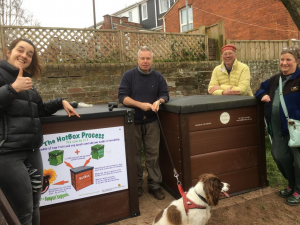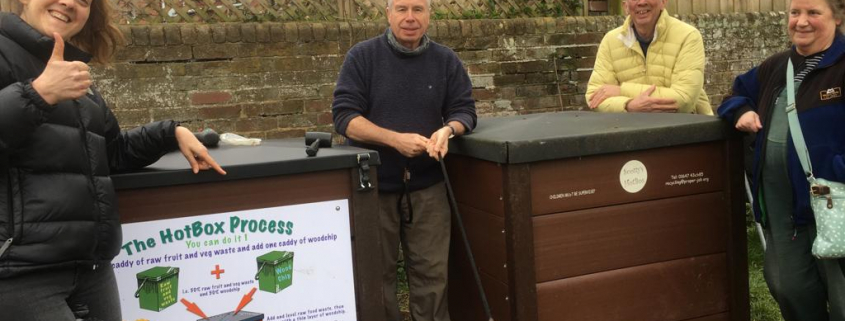Community Composting Revolution
Community Composting Revolution
 Nicky Scott, otherwise known as Mr Compost, is based in Devon and for many years has been the driving force in Community Composting across the county. This is his story.
Nicky Scott, otherwise known as Mr Compost, is based in Devon and for many years has been the driving force in Community Composting across the county. This is his story.
When I started a very small community composting project on our allotments in Chagford, on Dartmoor, I had no idea how it was going to grow. Initially, I was frustrated, firstly by people on our allotments having choking bonfires all the time. The smoke would roll down the hill and invade our house; not ideal when you have babies asleep inside.
Secondly, in those days we had ‘bulky household skips’ brought to our car park every month, for people to dispose of stuff the refuse collection couldn’t take. I soon realised a huge amount of garden clippings, hedge prunings, woody waste, grass cuttings and so on was being dumped so I called Devon County Council to suggest that they dedicate a skip just for garden stuff to stop it going to landfill and then we could use it on the allotments. To my enormous surprise they thought it was a great idea!
To cut a long story short, those humble beginnings coupled with a long relationship with all the Devon Councils not only has seen our project develop a flagship Reuse Site with a shop in town, but on the way we have run a market garden and created a community whole-food, organic and local fruit and veg shop and café. Devon CC had a plethora of phone calls wanting similar projects and I was eventually employed to help these community ventures. My role expanded to include food waste composting in schools and a national network (now sadly folded) was formed; the pioneer groups from around the country had a base in Sheffield on a city farm. This group has recently been resurrected as an online group ‘Composting in the Community’, and also a new group called the ‘Mycelium Network’ has formed, which is more focussed on small scale food waste composting.
People are finally coming to realise that we cannot waste so much and that reducing waste as much as possible has to be the first step. Making compost and using fermentation techniques are brilliant ways to bring people together in social enterprises that can also employ people. The value of compost is growing with some projects getting as much as £1,000 a dumpy bag full. Making compost, especially as close as possible the source of the raw materials, is a brilliant way not only to cut down on CO2 emissions but also to sequester carbon in the soil, particularly when coupled with no-dig systems. Our initial aim in Chagford was to demonstrate to everyone how to make good compost. Food waste is always a challenge and neighbourhood groups can really work. I’ve seen it happen here and in other countries around the world.
For Nicky’s work visit https://drdotcompost.wordpress.com/
For Old Tree Mycelium Network visit https://old-tree-mycelium-network.mn.co/ &




